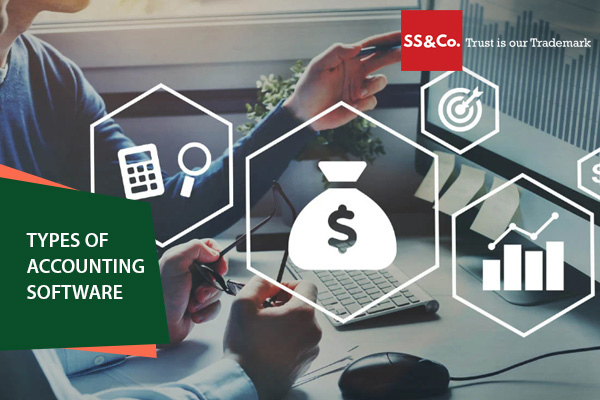Types of Accounting Software

In the Present times, where data is the king of the business world, accounting software acts more as a tool than just tools but an asset to guide the executives with the real-time financial standing of their business. This not only helps them take more thoughtful and innovative decisions but also keeps them ahead in the competitive market crowd. That being said, understanding the purpose behind each software and picking the perfect software for accounting can be a tough nut to crack. With numerous platforms each offering distinct features and evolving accounting needs, finance professionals often feel overwhelmed by the choices. One wrong pick means not just that your time and money are wasted, but you are also more exposed to legal challenges. This all-in-one guide will list key categories of accounting software, their applications, and the best software available in the market, so you can boost your career chances in KSA and beyond.
What is Accounting Software?
Accounting Software is basically a computer program that facilitates the bookkeepers and accounting teams in analyzing, recording, and reporting financial transactions, along with non-financial transactions of a company. It has become a modern-day necessity since it saves time and resources by digitizing the manual accounting functions. With these accounting tools, authorities can have better control and decision-making as they get real-time access to their financial data, precision in each calculation, and prompt reporting and analysis. Having no tool today is like living in the past with over-exhaustion, less productivity, lack of competitiveness, and inefficiencies creeping into every corner of accounting procedure. The error-prone manual entries of data, vulnerable bank reconciliation, complex payroll management, and inaccurate financial reporting are some of the major disadvantages of not deploying accounting software. In short, one can say that without having accounting software, not just the accountants will suffer more, but the chances of a business succeeding will be nearly zero.
Types of Accounting Software
1. Spreadsheet Software
Handwritten spreadsheets were most commonly used in businesses before the rise of advanced accounting tools. The first evolution in accounting was the digital invoices, which are still widely used, such as Microsoft Excel, Google Sheets, and LibreOffice Calc. These tools are basic accounting tools, and their major features include,
- Custom-made templates for bookkeeping and budgeting
- Manual data entry
- Basic calculation formulas like profit, loss, or ratio
- Designing graphs and charts for analysis
These tools are not just economical but also offer flexibility to create personalized solutions. They are easy to grasp by even non-technical teams and used in almost every area of a business, not just for financial tasks. However, they are subject to manual errors and lack automation. They are only well-suited for small businesses or startups with small financial transactions.
2. Commercial Off-the-Shelf Accounting Software
Commercial off-the-shelf (COTS) accounting software is generally utilized for the day-to-day financial operations of any business. Some common COTS software is:
- QuickBooks, which is used for tax filing and bookkeeping, is mainly used by SMEs
- Xero is a cloud-based software that gives real-time access to data used by startups
- FreshBooks simplifies the management of finances, usually for freelancers
- Sage Business Cloud Accounting is a tool used for reporting and compliance
These tools help the companies in managing,
- Accounts payable and receivable
- Processing of Payroll
- Tracking of expenses and creating budgets
- Invoicing and billing automation
- Compliance with taxes
- Merging with bank accounts
These tools are not just budget-friendly but also user-friendly. They come with customer support facilities and cloud-based remote access. However, they lack customization with varying subscription charges and limited features. They are mostly used by SMEs that look for a reliable accounting solution.

3. Enterprise Resource Planning (ERP) Systems
ERP systems are not bound to just accounting, but they interconnect every department of business, like finance, inventory, human resources, and supply chain. This, in turn, helps in accounting practices, hence can be considered an important component of accounting. SAP ERP, Oracle NetSuite, Microsoft Dynamics 365 Finance & Operations, and Infor ERP are some of its core examples. Their features include:
- Common management of Data across all the departments
- Progressive financial analysis and reporting of data
- Support with handling multi-language and multi-currency
- Dashboards in real-time and analytics
- Management of inventory and assets
They offer an advanced level of implementation across various business functions. They help in better compliance and audit trials; they also offer scalability for global operations. However, they can be too expensive for small or low-budgeted businesses to implement and operate, and require IT training and support. They are mostly used by large corporations and multinational organizations.
4. Custom Accounting Software
Many companies ask for customized software to meet the distinct needs of their businesses, and custom-made software is created from the bottom up and is a modified version of the already existing software. Such as Odoo, built custom ERP modules and tailored solutions developed on Zoho Creator. Their key features include,
- Industry-specific personalized models
- Incorporation with the proprietary systems
- Special dashboards for reporting
These tools offer complete control over the features and functionality to emphasize the industry’s needs. They are also scalable as the business grows. However, they can be heavy on the pocket as they need a high cost of maintenance and development. They are also more dependent on developers and consume time to develop. These tools are best suited for industries where typical accounting software cannot fit the needs.
5. Cloud-Based Accounting Software
Cloud-based accounting tools have completely revamped business financial management practices by offering access anywhere, anytime. Data is synced digitally and stored on remote servers that teams can access around the globe with just an internet connection. QuickBooks Online, Xero, FreshBooks, Zoho Books, and KashFlow are some common examples. Its key features include,
- Online accessibility from various devices
- Syncing of important data and updates in real time
- Updating systems and taking backups automatically
- Collaboration among multiple users and teams
These tools are beneficial for remote teams with minimal cost, mostly subscription charges. They can also expand with business growth and offer data security with encryption protocols. However, these tools need internet connectivity around the clock and come with yearly subscription fees. These tools are today widely used by almost every business, regardless of their size and industry.
6. Industry-Specific Accounting Software
There are certain accounting software programs that have built-in features for specific industries. This software only addresses the needs of these niches, such as Sage 300 Construction, real estate, and Medisoft for healthcare. Core features of these tools include,
- They can be customized by the user as per their industry guidelines
- They offer special reporting built-in features, like patient billing in healthcare
- Interconnection with industry tools like POS systems and medical software
These tools not only help the internal teams but also ease regulatory compliance. However, they can sometimes be more costly than general accounting tools. They are best suited for industries dealing with unique accounting challenges.
7. Payroll Accounting Software
Many accountings software come with essential payroll requirements, yet for complete payroll management, special tools are required they specially focus on employment compensation, for example, ADO, Paychex, etc. Their key features are,
- Digitized computation of Salaries
- Automated tax deduction and compliance handling
- Tracking of working hours and attendance
- Direct payment deposition in accounts
These tools not only refine and ease the management of payroll but also lessen the risks of tax penalties. Employees are also motivated and satisfied with the timely payments, which fosters proficiency, motivates them, and results in less employee turnover. However, it might also demand other accounting tools and may not be very budget-friendly for small companies. Businesses with large teams and complex payroll needs usually go for payroll accounting software.
8. Hybrid Accounting Software
Hybrid software includes cloud-based accessibility and on-premises storage attributes. They are not just flexible but also give control over sensitive data. Such as Sage Intacct, Oracle NetSuite Hybrid setups, and Microsoft Dynamics 365 (with hybrid deployment options). Their key features are,
- Accessibility of partial data offline
- Merging with local databases
- Gives remote access for limited users
They give a balance of both security and control of confidential data with online accessibility. However, they can be hard to operate as compared to full hybrid models and cost more due to dual capabilities. Businesses with sensitive data usually utilize these tools that require remote access.
Important Considerations Before Choosing Accounting Software
- Analyze your business size and the complexities of accounting operations. Small companies can work on tools like Wave, while larger corporations might require ERP solutions
- Know your budget, be it free spreadsheets or costly ERP solutions; your budget decides your tool.
- Prefer a software that has the capability to grow with your business
- Ensure that the accounting tool fulfills your industry-specific needs and offers solutions accordingly
- Make sure that your desired solution fits your current tools, like CRM or inventory systems
- Prefer a user-friendly interface that teams can adopt quickly without the need to hire an extra employee
- Prioritize security, specifically when picking cloud-based solutions. If the budget allows, then prefer a hybrid over cloud.
Why do you need SS&CO for the Deployment of Accounting Software in KSA?
SS&CO KSA, being one of the leading accounting services providers, understands the needs of each industry and business scale. We know for a fact that deploying and operating the latest accounting solutions can be burdensome for internal teams; that’s why we offer support in the integration of the best accounting software in Saudi Arabia. We facilitate for you in
- Assessing business needs and handpicking the right tool
- Supervising setup, customizing, and integration of payroll, inventory, and tax systems
- Controlled and safe data migration for complete compliance with VAT/ZATCA
- Offering ongoing training and support programs
Get in touch with us today and let us help you in picking and implementing accounting software in Saudi Arabia.

